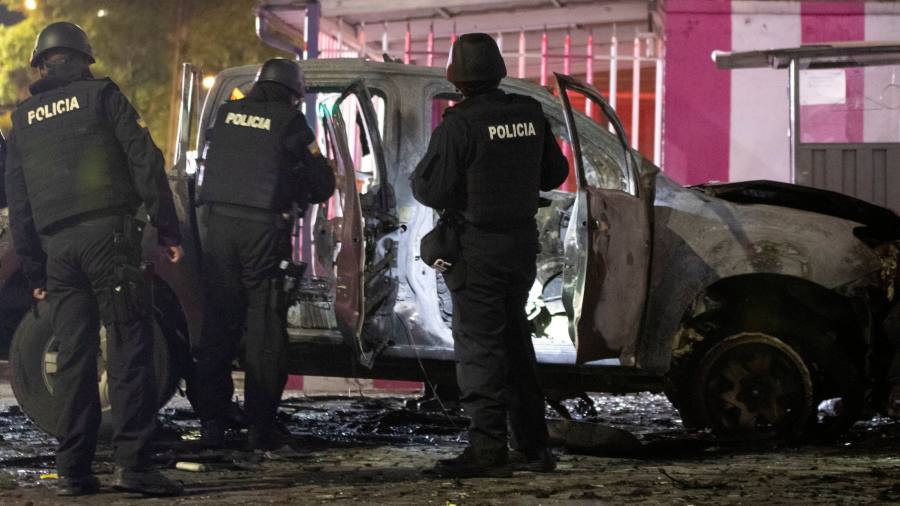
Receive free Ecuador updates
We’ll send you a myFT Daily Digest email rounding up the latest Ecuador news every morning.
Four car bombs exploded within hours in Ecuador in the latest display of violence that has rattled the country ahead of its presidential election.
Two of the bombs exploded in Quito, the capital, while two more went off near Ecuador’s southern border with Peru, according to the national police. All of the bombings took place between late Wednesday night and early Thursday morning, and no injuries were reported, the police said.
“Specialised national police units remain active and are investigating,” said Juan Zapata, the country’s interior minister, on social media on Thursday.
Violence has become one of the defining issues on the campaign trail ahead of the second round of the Ecuador’s presidential election, which will take place on October 15, pitting leftist lawmaker Luisa González, a protégé of former president Rafael Correa, against Daniel Noboa, the son of Álvaro Noboa, a billionaire banana magnate.
On August 10, the country was shocked by the murder of anti-corruption candidate Fernando Villavicencio, as he left a rally in Quito. The government of outgoing president Guillermo Lasso pledged to pursue the “intellectual authors” of the assassination.
“Here nothing is free,” Villavicencio said in a speech to supporters before his death. “This democracy has cost us our lives. Defending the homeland has cost us our lives.”
In the first six months of the year, 3,500 homicides were reported in Ecuador, according to police statistics. Last year, 4,800 people were murdered, almost double the rate in 2021 and quadruple that of 2018.
Prisons have become the epicentre of Ecuador’s ongoing crime wave. The bombs in Quito exploded outside the former and current offices of the country’s national prison agency.
Six suspects — five Ecuadoreans and one Colombian — have been arrested in connection with the attacks in Quito, which authorities said were in retaliation over an ongoing crackdown in the nation’s prisons, which have become bases for organised crime and the scenes of several riots and massacres.
Earlier this month, the transfer of jailed gang leader José Adolfo Macías, known as “Fito”, to a maximum-security prison in Guayaquil triggered unrest in the port city. On Wednesday, authorities launched a crackdown in Cotopaxi prison, near Quito, though they did not announce the transfer of any high-profile inmates to a more secure facility.
Wagner Bravo, the secretary for state security, told local media that the car bombs were intended to “prevent us from continuing to fulfil the role of the armed forces and the police in controlling these prisons”.
Daniel Pontón, a professor of sociology at the national institute of higher studies in Quito, said that the bombings may not have a direct effect on the election, though they could give voters cause to question the security policies of the candidates.
“The government looks very bad on security over the last few years as it has been unable to get a grip on crime,” said Pontón. “And it has caused frustration among the public which can shake up the second round of the election.”